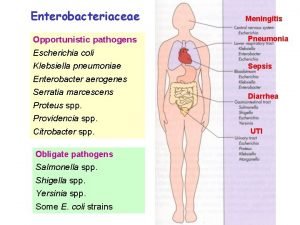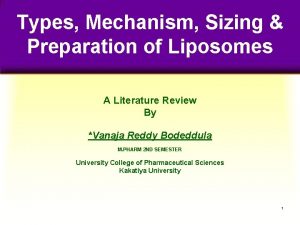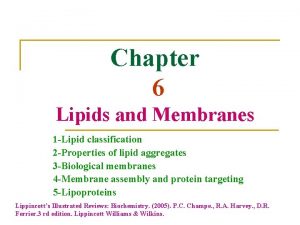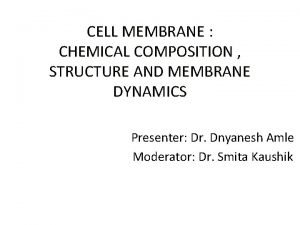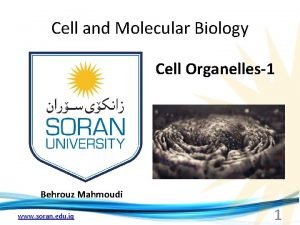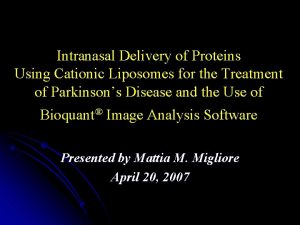Modified liposomes for cytosolic Company delivery in antigen




- Slides: 4

Modified liposomes for cytosolic Company delivery in antigen presenting cells logo through the proton sponge effect Keeho (Arnold) Lee, Dr. Allan Gamble, Prof. Sarah Hook School of Pharmacy, University of Otago, NEW ZEALAND Introduction Cross presentation is an ill defined process which occurs within dendritic cells. As it is important for raising a cell mediated response, simplifying this process may be beneficial for tumour vaccines. Cytoplasmic delivery may provide a solution, as antigens may be processed through the well-known endogenous proteasome mediated pathway for MHC-I loading. Polyethylenemine (PEI) has been used to transfect cells through the proton sponge effect, which relies on the acidic environment found in late endosomes. The effect has been used to transfect cells more efficiently compared to traditional p. H sensitive liposomes. Therefore, the incorporation of PEI into modified liposomes with tumour antigen may lead to cytoplasmic delivery of antigen, leading to improved MHC-I loading without the need for cross presentation. Hosted by

Modified liposomes for cytosolic Company delivery in antigen presenting cells logo through the proton sponge effect Keeho (Arnold) Lee, Dr. Allan Gamble, Prof. Sarah Hook School of Pharmacy, University of Otago, NEW ZEALAND Methods Artificial ion channels were synthesised by first creating a carbon tail (with alkyne), which was clicked onto prepared per-azido beta cyclodextrin. This creates an artificial ion channel Liposomes were prepared through the thin film hydration process. DPPC phospholipid and channels were deposited as a thin film. The film was then hydrated with an aqueous solution containing bioactives. The resulting dispersion was sonicated until clear p. H sensitivity was measured by incubating liposomes in p. H 4. 5 or p. H 7. 4 conditions for 4 hours. Liposomal lysis was determined using dynamic light scattering Hosted by

Modified liposomes for cytosolic Company delivery in antigen presenting cells logo through the proton sponge effect Keeho (Arnold) Lee, Dr. Allan Gamble, Prof. Sarah Hook School of Pharmacy, University of Otago, NEW ZEALAND Results and conclusions Liposomes were found to be homogenous, with an average diameter of 120 -150 nm. The small particle size is suitable for passive targeting to acidic late endosomes, while homogeneity is beneficial for pharmacokinetics. Size (nm) PDI Liposomes only 154. 6 ± 0. 6 0. 342 ± 0. 003 0. 5% channels 148. 0 ± 12. 0 0. 281 ± 0. 010 1% channels 116. 9 ± 0. 9 0. 260 ± 0. 006 Incubation of liposomes in p. H 4. 5 and 7. 4 conditions showed a small (4. 8%), but significant increase in lysis of liposomes with 0. 5% channels in acidic conditions. These results agree with previous reports, and this small effect is expected to translate into a larger effect in cells. Hosted by 0. 5% channels 10 1000 Size (nm)

Modified liposomes for cytosolic Company delivery in antigen presenting cells logo through the proton sponge effect Keeho (Arnold) Lee, Dr. Allan Gamble, Prof. Sarah Hook School of Pharmacy, University of Otago, NEW ZEALAND Future directions Current focus is on showing in-vitro effects using murine bone marrow derived dendritic cells by observing uptake via flow cytometry and confocal microscopy. In-vivo effects will be investigated using a murine melanoma model (prophylactic and therapeutic treatment) Acknowledgements University of Otago – Scholarship and project funding ASI NZ branch – Travel bursary School of Pharmacy – Facilities and support New Zealand Pharmacy Education and Research Foundation (NZPERF) – Project funding Hosted by
